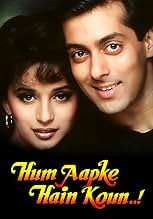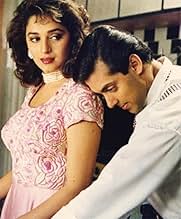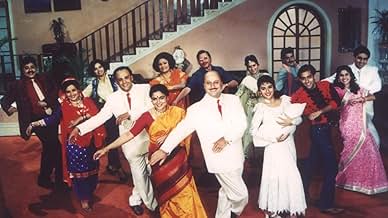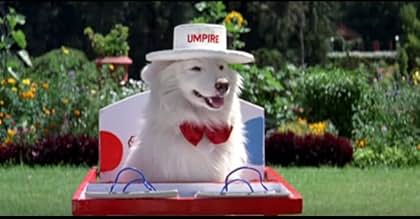NOTE IMDb
7,5/10
24 k
MA NOTE
Ajouter une intrigue dans votre languePrem and Nisha meet and fall in love at the wedding of their elder siblings, but their plans to be together are put in jeopardy when Nisha's sister dies, leaving behind a baby.Prem and Nisha meet and fall in love at the wedding of their elder siblings, but their plans to be together are put in jeopardy when Nisha's sister dies, leaving behind a baby.Prem and Nisha meet and fall in love at the wedding of their elder siblings, but their plans to be together are put in jeopardy when Nisha's sister dies, leaving behind a baby.
- Réalisation
- Scénario
- Casting principal
- Récompenses
- 10 victoires et 9 nominations au total
Alok Nath
- Kailash Nath
- (as Aloknath)
Reema Lagoo
- Mrs. Choudhury
- (as Rima)
Bindu Desai
- Bhagwanti Mami
- (as Bindu)
Ajit Vachani
- Professor Mama
- (as Ajit Vachhani)
Priya Arun Berde
- Chameli
- (as Priya Arun)
Redo
- Tuffy (The Dog)
- (as Tuffy)
Avis à la une
No Spoiler but is rather lengthy and maybe too much detail for some people.
Hum Aapke Hain Koun, what can I say about it. I'll start with the fact is my favorite movie of all time. Why? I really can't say. Because believe me when I say that there have been much better movies made before and since it. I know this and yet this remains my favorite.
The story is quite simple, too simple some people say but thats not necessarily a bad thing. It's about Prem (Salman Khan) and Nisha's(Madhuri Dixit) love story. Prem is from a loving family and home, appropriately called Prem Nivas. Everyone loves everyone else including the servants and pets who are treated as one of the family. When Prem's older brother Rajesh's (Monish Behl) marriage is arranged with Pooja (Renuka Sahane), the oldest daughter of a Professor Chaudhary (Anupam Kher) and his wife (Reema Lagoo). The Professor and his wife are also school friends of Prem's kaka or uncle (Alok Nath) who has brought up the two brothers after the death of his sister and her husband.
During this 'rishta' Prem meets Nisha who is Pooja's younger sister. He immediately falls in love with her, but Nisha develops a strong dislike of him. What follows is a sweet and mischievous intercourse of jokes and pranks that they play on each other during the marriage ceremonies. While taking his bhabhi (sister-in-law) home, Prem apologizes to Nisha for anything he has done. Nisha is extremely surprised at his sensitiveness and also begins to like him.
Following this are many sweet sequences of how their love blossoms with songs aplenty in between. While the two are lost in each other and their new found relationship, fate takes a nasty turn as tragedy strikes both the households. Prem and Nisha find themselves in a delicate situation. And they call upon themselves to sacrifice their love and happiness for their families.
Music is excellent. No ground-breaking stuff nor any A.R Rahman genius of any kind. But it is entertaining, catchy and sweet and some numbers such as Didi tera dewar will remain in our memories for ever. Picturization is also excellent. Not one song should be skipped in the movie. Not even the two minute long babul song.
Performances are of course excellent. Madhuri Dixit excells as Nisha and completely convinces the audience as the sweet-hearted but mischevious sweetheart of the house. Nisha's character reminds me slightly of Rekha's Manju in Hrishikesh Mukherjee's Khubhsoorat. This is Salman Khan's best performance to date. Even though I'm quite obsessed with him, I own that he is not a very good actor. But in this movie he is flawless as the sweet and lovable Prem. The rest of the cast was also well chosen, every single one of them from Pooja to Tuffy the dog. They gave us the impression of being a real family. Many movies since have used almost all the members of this cast for other family movies.
Direction is also excellent. Sooraj Barjatiya excells at romantic cinema. The scenes between Prem and Pooja and Prem and Rajesh show the love between bhabhi and her devar and two brothers. The sweet moments between Prem and Nisha are also fantastic as they hold your heart still for several minutes. The intricacies of love, from first attraction, to love slowly growing in a young girl's heart to deep understanding are shown with intricate and realistic detail.
The one letdown is the screenplay by Sooraj Barjatiya. Some lines given to Salman are embarassing, especially the english ones where the sentences are not sentences. Pretty sad for someone who has an MBA.
HAHK was a landmark in indian cinema for many reasons. First was that it was the first movies with no violence at all. The whole marriage song craze also started. First full-fledged family drama. Since then we've had many such movies and most of the audience has become bored of them. I think the last one of this genre we'll be seeing is Kabhi Khushi Kabhie Gham. I personally love these non-violent family dramas, I don't think I'll ever get sick of them. Today, many people will say that HAHK wasn't a good movie, and I think it is because they have seen too many of the copies made after it. I still maintain that it's my favorite movie and that not only should you watch it but also own it. It is the Sholay of our times although I never liked Sholay :)
Hum Aapke Hain Koun, what can I say about it. I'll start with the fact is my favorite movie of all time. Why? I really can't say. Because believe me when I say that there have been much better movies made before and since it. I know this and yet this remains my favorite.
The story is quite simple, too simple some people say but thats not necessarily a bad thing. It's about Prem (Salman Khan) and Nisha's(Madhuri Dixit) love story. Prem is from a loving family and home, appropriately called Prem Nivas. Everyone loves everyone else including the servants and pets who are treated as one of the family. When Prem's older brother Rajesh's (Monish Behl) marriage is arranged with Pooja (Renuka Sahane), the oldest daughter of a Professor Chaudhary (Anupam Kher) and his wife (Reema Lagoo). The Professor and his wife are also school friends of Prem's kaka or uncle (Alok Nath) who has brought up the two brothers after the death of his sister and her husband.
During this 'rishta' Prem meets Nisha who is Pooja's younger sister. He immediately falls in love with her, but Nisha develops a strong dislike of him. What follows is a sweet and mischievous intercourse of jokes and pranks that they play on each other during the marriage ceremonies. While taking his bhabhi (sister-in-law) home, Prem apologizes to Nisha for anything he has done. Nisha is extremely surprised at his sensitiveness and also begins to like him.
Following this are many sweet sequences of how their love blossoms with songs aplenty in between. While the two are lost in each other and their new found relationship, fate takes a nasty turn as tragedy strikes both the households. Prem and Nisha find themselves in a delicate situation. And they call upon themselves to sacrifice their love and happiness for their families.
Music is excellent. No ground-breaking stuff nor any A.R Rahman genius of any kind. But it is entertaining, catchy and sweet and some numbers such as Didi tera dewar will remain in our memories for ever. Picturization is also excellent. Not one song should be skipped in the movie. Not even the two minute long babul song.
Performances are of course excellent. Madhuri Dixit excells as Nisha and completely convinces the audience as the sweet-hearted but mischevious sweetheart of the house. Nisha's character reminds me slightly of Rekha's Manju in Hrishikesh Mukherjee's Khubhsoorat. This is Salman Khan's best performance to date. Even though I'm quite obsessed with him, I own that he is not a very good actor. But in this movie he is flawless as the sweet and lovable Prem. The rest of the cast was also well chosen, every single one of them from Pooja to Tuffy the dog. They gave us the impression of being a real family. Many movies since have used almost all the members of this cast for other family movies.
Direction is also excellent. Sooraj Barjatiya excells at romantic cinema. The scenes between Prem and Pooja and Prem and Rajesh show the love between bhabhi and her devar and two brothers. The sweet moments between Prem and Nisha are also fantastic as they hold your heart still for several minutes. The intricacies of love, from first attraction, to love slowly growing in a young girl's heart to deep understanding are shown with intricate and realistic detail.
The one letdown is the screenplay by Sooraj Barjatiya. Some lines given to Salman are embarassing, especially the english ones where the sentences are not sentences. Pretty sad for someone who has an MBA.
HAHK was a landmark in indian cinema for many reasons. First was that it was the first movies with no violence at all. The whole marriage song craze also started. First full-fledged family drama. Since then we've had many such movies and most of the audience has become bored of them. I think the last one of this genre we'll be seeing is Kabhi Khushi Kabhie Gham. I personally love these non-violent family dramas, I don't think I'll ever get sick of them. Today, many people will say that HAHK wasn't a good movie, and I think it is because they have seen too many of the copies made after it. I still maintain that it's my favorite movie and that not only should you watch it but also own it. It is the Sholay of our times although I never liked Sholay :)
People may dismiss this movie today as artificial and too cheesy but the fact remains it kept the box office cash registers ringing when it released in 1994 for years. Coming to the movie, it doesn't have any story at all but what keeps the audience glued to the movie is its tight screenplay, direction, melodious songs and the strong performances of every actor. The human relations shown were pure and simple. I must have watched this movie over and over again and every time I watched it, there was always a smile on my face and it always feels like a festival to me when I watch this movie. This movie brilliantly showcases the talented madhuri dixit.
Some parts of the movie were a bit cheesy in my opinion, but I mean, that was kind of Bollywood's thing back then I suppose, and I do think that the cheesiness of the acting and plot is what accentuates the humor in this film. Anyways, this film was actually quite entertaining. As an American, Bollywood films don't always appeal to me, but this movie was quite good. My dad put this up on Netflix with my mom, as I walked into the room, and I was instantly hooked. It had such an adorable plot line with highly likable characters that you'll instantly fall in love with in seconds. The jokes were extremely clever as well, and of course goofy and cheesy (in a sort of odd and satisfying way). In conclusion, the film is lighthearted, romantic, humorous, and just downright adorbs.
Hum Aapke Hain Koun was a landmark film, undoubtedly. Love it, hate it, but you couldn't ignore it. Everyone watched it, from enthusiastic children to their doting parents, and even the parents' parents. Young lovebirds watched it together, for they imagined themselves in Madhuri Dikshit and Salman Khan pondering about what chaste love and sacrifice really could mean. I went to watch it too, and I had both the wife and the mother in tow, and this was probably the last time my mother stepped into the cinema theatre before her untimely demise, and that's one of the reasons that the film will hold a special place in my heart. Towards the end of the film, both the women between whom I was comfortably lodged, were in copious tears, leaving me thoroughly helpless and beleaguered.
Hum Aapke Hain Koun actually lacked originality. It was a shiny, polished, glitzy and expensive rehash of Rajshri's very own "Nadiya Ke Paar", helmed by Govind Moonis and starring Sachin and Sadhna Singh in a dual role. The storyline is absolutely similar, but the original was set in rural India which was Rajshri Production's usual playground. Nadiya Ke Paar was steeped in reality, sans the glamour, traditional overdose and musical melodrama of its later version and is unsurprisingly rated higher on IMDB. In stark contrast, Hum Aapke Hain Koun was all chocolatey, brimming with acts of kindness, upholding humanity, values and traditions to the point that one could choke, not with emotions, but out of sheer disbelief. Why doesn't God make any more men and women with such virtues?
But all the above information and critique is in hindsight, and certainly not straight from 1994. When Hum Aapke Hain Koun released, in spite of my having mapped it to Nadiya Ke Paar, I found it delightful and refreshing. Madhuri Dikshit was in her sublime form and Salman Khan played the perfect foil, energetic and charismatic. I thought he remained underrated in the film's super success story, and my heart went out to his role, just this once other than his performance in Bajrangi Bhaijaan. The music of Hum Aapke Hain Koun by Raam Laxman (Vijay Patil) was soulful, standout, immensely hummable and almost definitely the main reason for the film's runaway success, even though it came down as an overdose, almost resembling an incessant downpour. There was no lack of drama, melodrama, dialoguebaazi and the goofy goodness of everyone in the script - there wasn't an iota of badness anywhere. It's actually quite difficult to draw a parallel with Sooraj Barjatya's Hum Aapke Hain Koun, even today. Cheers to the twenty six years that Hum Aapke Hain Koun has traversed, it's often aired even now and remains immensely watchable, for different reasons to different people.
Hum Aapke Hain Koun actually lacked originality. It was a shiny, polished, glitzy and expensive rehash of Rajshri's very own "Nadiya Ke Paar", helmed by Govind Moonis and starring Sachin and Sadhna Singh in a dual role. The storyline is absolutely similar, but the original was set in rural India which was Rajshri Production's usual playground. Nadiya Ke Paar was steeped in reality, sans the glamour, traditional overdose and musical melodrama of its later version and is unsurprisingly rated higher on IMDB. In stark contrast, Hum Aapke Hain Koun was all chocolatey, brimming with acts of kindness, upholding humanity, values and traditions to the point that one could choke, not with emotions, but out of sheer disbelief. Why doesn't God make any more men and women with such virtues?
But all the above information and critique is in hindsight, and certainly not straight from 1994. When Hum Aapke Hain Koun released, in spite of my having mapped it to Nadiya Ke Paar, I found it delightful and refreshing. Madhuri Dikshit was in her sublime form and Salman Khan played the perfect foil, energetic and charismatic. I thought he remained underrated in the film's super success story, and my heart went out to his role, just this once other than his performance in Bajrangi Bhaijaan. The music of Hum Aapke Hain Koun by Raam Laxman (Vijay Patil) was soulful, standout, immensely hummable and almost definitely the main reason for the film's runaway success, even though it came down as an overdose, almost resembling an incessant downpour. There was no lack of drama, melodrama, dialoguebaazi and the goofy goodness of everyone in the script - there wasn't an iota of badness anywhere. It's actually quite difficult to draw a parallel with Sooraj Barjatya's Hum Aapke Hain Koun, even today. Cheers to the twenty six years that Hum Aapke Hain Koun has traversed, it's often aired even now and remains immensely watchable, for different reasons to different people.
It was on 5th August 1994 that Sooraj Barjatya's Hum Aapke Hain Koun (HAHK) premiered at Liberty cinema, Mumbai. A unique strategy devised by Rajshri Productions; they released their close to three hour thirty minutes long film only in one theatre per city in a bid to curb video piracy. The film prints used to be taken back from these cinemas every night to Rajshri office and resend the next morning just in time for the matinee show.
Like it happened with Sholay (1975), quite a few critics wrote off HAHK as a flop in it's first week dismissing it as an extended Marwari wedding video. But then the audience was clearly impressed with director Sooraj Barjatya's adaptation of Rajshri's own 'Nadiya Ke Paar' (1982). HAHK picked up with strong word of mouth and ran for 125 weeks (that's more than two years!!) at Mumbai's Liberty cinema. This film brought families back to theatres and audience (specially ladies) used to come dressed up as if they were actually attending a marriage!!
Salman Khan and Madhuri Dixit had worked earlier in Saajan (1991) and Dil Tera Aashiq (1993) but their chemistry in HAHK was something else altogether. Truly awesome! Particularly, Madhuri looked super gorgeous and her dresses became a style statement for years to come. Madhuri herself, became the nation's heartthrob and even the late MF Hussain's heart went dhak dhak for her as he announced a film called Gaja Gamini (2000) to be directed by him just for her.
HAHK broke all box office records emerging the biggest hit of all time, took home five Filmfare awards including Best actress for Madhuri Dixit and also won the coveted National award for Best Film providing wholesome entertainment that year.
I saw HAHK first at Rajshree cinema (Gandhinagar) which was specially decked up to resemble a wedding hall. The gigantic screen used to get illuminated with lights during the two popular songs - "Didi Tera Devar Deewana" and "Joote Le Lo". This film was also the only one after Raj Kapoor's Sangam (1964) and Mera Naam Joker (1970) to have two intermissions (atleast in its initial weeks).
Todays generation may find HAHK to be indulgent and boring piece of cinema (atleast my son does!!) but we 90s kids, know its euphoria and influence on pop culture. Indian wedding celebrations were never the same again!!
Regards, Sumeet Nadkarni
Like it happened with Sholay (1975), quite a few critics wrote off HAHK as a flop in it's first week dismissing it as an extended Marwari wedding video. But then the audience was clearly impressed with director Sooraj Barjatya's adaptation of Rajshri's own 'Nadiya Ke Paar' (1982). HAHK picked up with strong word of mouth and ran for 125 weeks (that's more than two years!!) at Mumbai's Liberty cinema. This film brought families back to theatres and audience (specially ladies) used to come dressed up as if they were actually attending a marriage!!
Salman Khan and Madhuri Dixit had worked earlier in Saajan (1991) and Dil Tera Aashiq (1993) but their chemistry in HAHK was something else altogether. Truly awesome! Particularly, Madhuri looked super gorgeous and her dresses became a style statement for years to come. Madhuri herself, became the nation's heartthrob and even the late MF Hussain's heart went dhak dhak for her as he announced a film called Gaja Gamini (2000) to be directed by him just for her.
HAHK broke all box office records emerging the biggest hit of all time, took home five Filmfare awards including Best actress for Madhuri Dixit and also won the coveted National award for Best Film providing wholesome entertainment that year.
I saw HAHK first at Rajshree cinema (Gandhinagar) which was specially decked up to resemble a wedding hall. The gigantic screen used to get illuminated with lights during the two popular songs - "Didi Tera Devar Deewana" and "Joote Le Lo". This film was also the only one after Raj Kapoor's Sangam (1964) and Mera Naam Joker (1970) to have two intermissions (atleast in its initial weeks).
Todays generation may find HAHK to be indulgent and boring piece of cinema (atleast my son does!!) but we 90s kids, know its euphoria and influence on pop culture. Indian wedding celebrations were never the same again!!
Regards, Sumeet Nadkarni
Le saviez-vous
- AnecdotesIt was the first Hindi film to gross over INR 1 billion.
- GaffesIn didi tera diwana, madhuri dress reverses fall from left to right during song.
- Crédits fousIn the end titles, the initial 'Hum Aapke Hain Koun...!' shortens to 'Hum Aapke Hain...!'.
- Versions alternativesA month after the film was released, it was taken out of theaters and replaced with a different print that included 2 new songs, Chocolate, Lime Juice, and Mujhse Juda Hokar. This is the most common version of the film. Both versions are available on EROS video. Later that year, the film was once again rereleased, this time with a few more dialogue scenes. It included a scene with Nisha's parents giving Tuffy the dog a gift, an alternative ending of the end of the song Yeh Mausum Kah Jadoo Hain Mitva, An extra scene in the temple, a scene with Nisha and Prem's brother before the ladies function, and an extended ending. This print is available on the video "Hum Aapke Hain Koun:The Original Video" (its in a red box) but it is not an original print, but a pirated one, which means the sound is muffled. Also, the print from which this was taken from was deteriorated to a certain extent, cutting out many of the ends of some of the scenes between Nisha and Prem (The kitchen scene before the engagement, and the pool scene after the ladies function). Some prints have an alternative Intermission logo (lightning strikes and the word Intermission appears, while the original print simply has the word fade in and out).
- ConnexionsEdited from Sholay (1975)
- Bandes originalesChali Re Chali Babul Ki Gali
Written by Dev Kohli
Composed by Vijay Patil
Performed by Sharda Sinha
Courtesy of Saregama HMV
Meilleurs choix
Connectez-vous pour évaluer et suivre la liste de favoris afin de recevoir des recommandations personnalisées
- How long is Hum Aapke Hain Koun..!?Alimenté par Alexa
Détails
- Date de sortie
- Pays d’origine
- Site officiel
- Langue
- Aussi connu sous le nom de
- Who Am I to You?
- Lieux de tournage
- Ooty, Tamil Nadu, Inde(Ooty)
- Société de production
- Voir plus de crédits d'entreprise sur IMDbPro
Box-office
- Budget
- 45 000 000 ₹ (estimé)
- Montant brut mondial
- 5 251 $US
- Durée3 heures 26 minutes
- Rapport de forme
- 2.55 : 1
Contribuer à cette page
Suggérer une modification ou ajouter du contenu manquant

Lacune principale
What is the French language plot outline for Hum Aapke Hain Koun..! (1994)?
Répondre





































